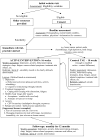Internet interventions for improving psychological well-being in psycho-oncology: review and recommendations
- PMID: 21608075
- PMCID: PMC3181007
- DOI: 10.1002/pon.1993
Internet interventions for improving psychological well-being in psycho-oncology: review and recommendations
Abstract
Objective: Too few cancer patients and survivors receive evidence-based interventions for mental health symptoms. This review examines the potential for Internet interventions to help fill treatment gaps in psychosocial oncology and presents evidence regarding the likely utility of Internet interventions for cancer patients.
Methods: The authors examined available literature regarding Internet interventions tailored to cancer patients' mental health needs and reviewed elements of Internet interventions for mental health relevant to advancing psycho-oncology Internet intervention research.
Results: Few rigorous studies focusing on mental health of cancer patients have been conducted online. A growing body of evidence supports the efficacy, accessibility, and acceptability of mental health Internet interventions for a variety of general and medical patient populations. The authors present recommendations and guidelines to assist researchers in developing, testing, and disseminating Internet interventions for cancer patients and survivors, to manage and improve their mental health. Issues unique to Internet interventions-including intervention structure, customization, provider interaction, and privacy and confidentiality issues-are discussed. These guidelines are offered as a step toward establishing a set of "best practices" for Internet interventions in psycho-oncology and to generate further discussion regarding the goals of such interventions and their place in cancer care.
Conclusions: Internet interventions have the potential to fill an important gap in quality cancer care by augmenting limited available mental health services. These interventions should be developed in a manner consistent with best practices and must be empirically tested and validated. Copyright © 2011 John Wiley & Sons, Ltd.
Copyright © 2011 John Wiley & Sons, Ltd.
Conflict of interest statement
The authors report no conflicts of interest.
Similar articles
-
Effects of Internet-based psycho-educational interventions on mental health and quality of life among cancer patients: a systematic review and meta-analysis.Support Care Cancer. 2020 Jun;28(6):2541-2552. doi: 10.1007/s00520-020-05383-3. Epub 2020 Mar 16. Support Care Cancer. 2020. PMID: 32179998
-
Transitions from biomedical to recovery-oriented practices in mental health: a scoping review to explore the role of Internet-based interventions.BMC Health Serv Res. 2017 Apr 7;17(1):257. doi: 10.1186/s12913-017-2176-5. BMC Health Serv Res. 2017. PMID: 28388907 Free PMC article.
-
Telephone interventions for symptom management in adults with cancer.Cochrane Database Syst Rev. 2020 Jun 2;6(6):CD007568. doi: 10.1002/14651858.CD007568.pub2. Cochrane Database Syst Rev. 2020. PMID: 32483832 Free PMC article.
-
Psychosocial interventions for advanced cancer patients: A systematic review.Psychooncology. 2019 Jul;28(7):1394-1407. doi: 10.1002/pon.5103. Epub 2019 May 23. Psychooncology. 2019. PMID: 31077475
-
Psycho-oncology.Dialogues Clin Neurosci. 2018 Mar;20(1):13-22. doi: 10.31887/DCNS.2018.20.1/ilangrollin. Dialogues Clin Neurosci. 2018. PMID: 29946207 Free PMC article. Review.
Cited by
-
Experiences of a web-based psycho-educational intervention targeting sexual dysfunction and fertility distress in young adults with cancer-A self-determination theory perspective.PLoS One. 2020 Jul 22;15(7):e0236180. doi: 10.1371/journal.pone.0236180. eCollection 2020. PLoS One. 2020. PMID: 32697801 Free PMC article.
-
Anxiety and health-related quality of life among patients with low-tumor burden non-Hodgkin lymphoma randomly assigned to two different rituximab dosing regimens: results from ECOG trial E4402 (RESORT).J Clin Oncol. 2015 Mar 1;33(7):740-8. doi: 10.1200/JCO.2014.57.6801. Epub 2015 Jan 20. J Clin Oncol. 2015. PMID: 25605841 Free PMC article. Clinical Trial.
-
Screening for depression in cancer patients receiving radiotherapy: Feasibility and identification of effective tools in the NRG Oncology RTOG 0841 trial.Cancer. 2017 Feb 1;123(3):485-493. doi: 10.1002/cncr.29969. Epub 2016 Nov 10. Cancer. 2017. PMID: 27861753 Free PMC article. Clinical Trial.
-
YouTube as a tool for pain management with informal caregivers of cancer patients: a systematic review.J Pain Symptom Manage. 2014 Dec;48(6):1200-10. doi: 10.1016/j.jpainsymman.2014.02.015. Epub 2014 Apr 30. J Pain Symptom Manage. 2014. PMID: 24793505 Free PMC article.
-
Study protocol of the CAREST-trial: a randomised controlled trial on the (cost-) effectiveness of a CBT-based online self-help training for fear of cancer recurrence in women with curatively treated breast cancer.BMC Cancer. 2016 Jul 25;16:527. doi: 10.1186/s12885-016-2562-0. BMC Cancer. 2016. PMID: 27455846 Free PMC article.
References
-
- Institute of Medicine (IOM) Cancer Care for the Whole Patient: Meeting Psychosocial Health Needs. Washington, DC: The National Academies Press; 2007. - PubMed
-
- Zabora J, BrintzenhofeSzoc K, Curbow B, Hooker C, Piantadosi S. The prevalence of psychological distress by cancer site. Psychooncology. 2001;10:19–28. - PubMed
-
- Massie MJ. Prevalence of depression in patients with cancer. J Natl Cancer Inst Monographs. 2004;32:57–71. - PubMed
-
- Kangas M, Henry JL, Bryant RA. Posttraumatic stress disorder following cancer: A conceptual and empirical review. Clin Psychol Rev. 2002;22:499–524. - PubMed
Publication types
MeSH terms
Grants and funding
LinkOut - more resources
Full Text Sources
Medical
Miscellaneous


